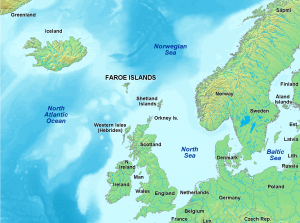Interview to be replayed Thursday at 5:00pm, November 29, 2012.
Anna Bjartmarsdottir, Asst. Professor of Library Science, shared information about education in Sweden, and universities and libraries in Iceland and the Faeroe Islands. The following map was found at http://upload.wikimedia.org/wikipedia/commons/f/f2/Map_of_faroe_islands_in_europe_-_english_caption.png
The CIA World Factbook includes overview information about countries (like an online Encyclopedia only with more detail like economy, energy, and communications). For information about Sweden, go to: https://www.cia.gov/library/publications/the-world-factbook/geos/sw.html
For information about Iceland, go to: https://www.cia.gov/library/publications/the-world-factbook/geos/ic.html
For information about the Faroe Islands, go to: https://www.cia.gov/library/publications/the-world-factbook/geos/fo.html
Sources to help you learn Nordic languages, and More…
Resources discussed this week include Mango Languages, a language learning database (that includes Icelandic!) that all Alaskans have free access to thanks to the Alaska State Library and an Interlibrary Cooperation Grant. To access Mango Languages, go to www.sled.alaska.edu/databases. You can find Mango Languages under A to Z, or Middle School, High School, and Education categories. To request a user name and password in Alaska,
call 1-800-440-2919.
Anna talked about the combined national/university library of Iceland in Reykjavik. When you go to the National and University Library of Iceland’s web page, http://landsbokasafn.is/index.php?page=english, you will see the phrase Access to Knowledge for Everyone. This idea is reinforced with links on the page for Researchers, Students, and International.
Anna also mentioned The Nordic House in Iceland. Their library web page is http://www.nordichouse.is/library . The link under Nordic Cooperation on this page will explain the idea behind these houses throughout the Nordic countries.
In my pursuit for more information about the Nordic Council, which was mentioned, I discovered the Scandinavian Library Quarterly! View the current issue, Volume 45, No. 3, 2012, titled Education for Librarianship, at http://slq.nu/. The Nordic Council has an informative web site also. Following is a link to the Nordic Council Resources web page: http://www.norden.org/en/resources.
Innovation in information literacy education in Denmark:
When a question about best practices from Nordic universities / libraries was asked, Anna shared information about an innovative, interactive, role-playing game that places you as a member of a study group researching a topic. Your success with this group project depends on good information retrieval. Developed at Aalborg University in Denmark, this tutorial is called SWIM (Streaming Web-based Information Modules). You can check out SWIM at http://content.aub.aau.dk/swim/ . Learn more about the SWIM project at http://www.swiminfo.dk/english.html.
Speaking of universities, I mentioned that Governor Brownback of Kansas initiated a program to offers free tuition for training in select state-needed technical professions. For more detail on this, go to: http://www.kansasregents.org/governors_cte_initiative
Nordic Literature and Music Sources shared by Anna: Following is a good article from the Guardian on the “unstoppable rise of Scandinavian Crime Fiction”: http://www.guardian.co.uk/books/2009/jan/23/scandinavian-crime-fiction
A blog about Scandinavian Crime Fiction
http://scandinaviancrimefiction.wordpress.com/
This link provides a great list of authors in the genre
http://www.eurocrime.co.uk/books/books_bib_Scandinavia.html
Icelandic Music scene
Icelandic music label and store
http://www.12tonar.is/index.php
Faroe Islands – Music label and store
ttp://www.tutl.com/
Music played during Informania, the week of Nov. 26, 2012: Information by Dredg, Take a Chance on Me, by ABBA, It’s Oh So Quiet, by Bjork
